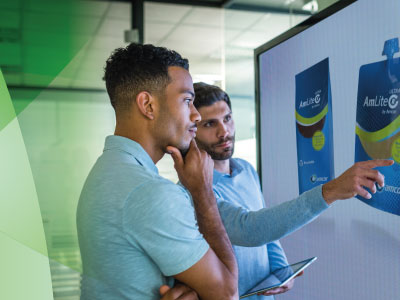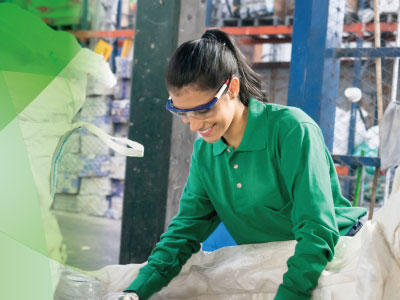Sustainability report - Our strategy
Our Strategy
Sustainability is Amcor’s most exciting growth opportunity. We are leveraging our unique scale, reach and expertise to meet our customers’ growing sustainability expectations and lead the way for the packaging industry.
Sustainability at Amcor
We know that there will always be a role for packaging – to protect and preserve products, extend shelf life, protect consumers, and promote brands.
We also know that the requirements of packaging are increasing, and end-of-use solutions for waste reduction are critical. While sustainability encompasses many aspects, the defining issue in our industry is how to minimize the presence of packaging waste in the environment and drive higher recycling rates for all packaging.
This is a challenge and an opportunity. The answer is responsible packaging, and Amcor is uniquely positioned and taking action to lead the way. Our leadership in this area rests on three pillars – innovating for product design, collaborating for better infrastructure, and informing for greater consumer participation.

Innovating
Amcor is leading the way in defining and developing the innovative, more sustainable products our customers want and their consumers expect. Our capabilities are best-in-class, with more than $100M annual investment in R&D and deeply experienced professionals working globally to create new packaging solutions. In the last four years, Amcor products have won many awards for innovation, including recognition for packaging that requires fewer resources or is designed to be recycled. This is the pillar of activity where we have the highest degree of control and we are proud of the progress we have made.
Amcor was the first packaging company to commit to all our packaging being recyclable or reusable by 2025 and, since making that commitment, we have gone further. By carefully selecting the raw materials we use, considering the life cycle impacts of our packaging, and designing for optimal end-of-use, we continue to demonstrate our leadership in responsible packaging.
Innovation in these areas keeps Amcor on course to meet our 2025 commitment and remain the partner of choice for customers seeking packaging that is more functional, attractive, intelligent, and sustainable.

Collaborating
Like other products, the collection and recycling of used packaging requires appropriate waste management infrastructure. In many countries, forward-thinking policies and environmental considerations over the years have led to steady investment in such infrastructure. Other regions, however, do not yet offer consumers an easy and effective way to participate in preserving the environment.
As governments and other organizations work on this front, Amcor is proactively lending our expertise and global perspective. In FY20, we became members of WWF ReSource: Plastic initiative: a global consortium of companies and organizations collaborating to keep waste out of the environment. We also collaborated with industry organizations around the world to develop standardized definitions for packaging recyclability and testing resources for flexible packaging, and participated in on-the-ground collaborations to develop recycling infrastructure. These augment our existing and long-standing partnerships with the Ellen MacArthur Foundation, Ocean Conservancy, and Earthwatch Institute.

Informing
On their own, product design and infrastructure are necessary but not sufficient. Ultimately, we also need to ensure that consumers have the understanding and the resources to recycle. This year, Amcor has worked with companies and non-governmental organizations (NGOs) across the value chain to build our understanding of how to create a plastics system that works.
In July 2020, we published our own research on consumer preferences regarding more sustainable, responsible packaging, helping brands empower their customers
to make smart, thoughtful purchasing decisions. Our regional partnerships enable us to continue to support efforts to understand and impact consumer behavior. Our involvement in thought leadership and advocacy helps us reach brands, consumers, and other stakeholders in markets around the world with balanced, accurate, fact-based information about responsible packaging.
Reducing Impacts and Reporting Progress
Alongside our clear sustainability strategy, as outlined above, Amcor is committed to managing, understanding, and reporting on our environmental and social footprint. This includes reporting on our overall environmental footprint, the safety of our Amcor colleagues, our responsible procurement activities, our approach to developing talent, and how we foster ethics and integrity at Amcor.
Today, sustainability informs every aspect of Amcor’s activities and standards – from employment practices to sourcing and manufacturing. For instance, through our EnviroAction program, we are continuously reducing our carbon footprint, cutting down on waste, and minimizing water usage. By 2030, Amcor will reduce our greenhouse gas emissions intensity by 60% compared to our 2006 baseline.
Our global presence gives us a footprint in hundreds of communities around the world and we work hard to foster good relationships and be a force for good wherever Amcor has a presence.
Transparency on our impacts and our work to reduce them is a responsibility that Amcor takes seriously. It helps us hold ourselves to account and shows leadership in our industry. We will continue to report regularly on our environmental and social progress.
We are proud that, this year, Amcor was recognized for our sustainability leadership by FTSE4Good, Ethibel Excellence Investment Register, the Institutional Shareholder Services ESG program, Ecovadis and MSCI.
In Closing
Amcor continues to lead on sustainability. This year we released our first-ever sustainability report written to Sustainability Accounting Standards Board (SASB) standards, taking a lead in driving transparency within the packaging industry. This transparency gives our customers – and our wider stakeholders – confidence in Amcor’s ongoing dedication to pioneering responsible packaging and to holding ourselves accountable to our wider sustainability responsibilities.
At Amcor, we see sustainability as our best opportunity for differentiation and growth. It guides everything we do and it animates our decisions. We will continue to leverage our unique strengths – our size, our scale, and our best-in-class capabilities – to make yet more progress in
FY21 and beyond.
“Accelerating the move to more responsible packaging will take coordinated commitment and action across the industry. I’m confident we’re on that path, and our people are proud to work for a company that’s delivering on its values and is changing the world.”
David Clark, Vice President – Sustainability, Amcor plc
2020 at a Glance
We work together with stakeholders and partners towards eliminating plastic waste in the environment. By innovating, collaborating and informing we deliver responsible packaging that meets consumers’ growing sustainability needs.

Download full Sustainability at a Glance PDF.
Sustainability Management Approach
As sustainability grows in importance to all Amcor’s stakeholders, our approach to managing it across our global company is more important than ever.
Our sustainability program convenes stakeholders from Amcor and throughout our value chain to identify and respond to the packaging industry’s most pressing environmental and social challenges. We collaborate with colleagues, customers, competitors, suppliers, industry groups, investors, governments, and NGOs to develop forward-thinking strategies to address these challenges.
Responsibility for sustainability at Amcor extends from the top leadership focused on big-picture strategy to regional and site-level teams focused on local opportunities.
Our sustainability initiatives are centrally coordinated by Amcor’s Vice President of Sustainability, who reports to the Chief Commercial Officer. A Sustainability Steering Committee supports this role in an advisory capacity. It consists of functional leaders from across the business, as well as Amcor’s CEO, who also holds a position on the Board of Directors. Top leadership also shares sustainability updates with the Board of Directors on a quarterly basis.
Amcor’s global sustainability team focuses on defining the strategic direction of our sustainability program and supporting Business Groups as they adapt and integrate global strategy into regional activities. It also oversees our global partnerships and manages sustainability data collection and reporting activities, including CDP and Dow Jones Sustainability Index disclosures, Global Commitment reporting, and the production of our annual sustainability report.
Business Group sustainability teams are led by experts in responsible packaging and serve as key drivers of sustainability within their regions.
These highly knowledgeable leaders collaborate with functional teams and site-level champions to identify and pursue technical, localized sustainability opportunities specific to their markets, portfolios, and customer needs. They also manage engagement with regional partners and are responsible for reporting monthly performance updates to Business Group leadership.
Together, our Global and Business Group sustainability leaders comprise Amcor’s Sustainability Leadership Council (SLC), which coordinates sustainability activities across the company and promotes the sharing of information, ideas, and feedback. This group formally meets once a month to drive internal initiatives, inform customer interactions, monitor and take action to achieve our EnviroAction goals, and assess emerging legislation related to packaging sustainability. It also provides Quarterly Business Reviews assessing progress toward goals to Amcor’s Global Management Team.
As sustainability becomes ever more integrated into Amcor’s core strategy, responsibility for sustainability performance is also becoming more formalized for leaders in functions such as R&D, sales and marketing, procurement, and operations. For example, in FY20 Amcor’s R&D function established a team specifically focused on integrating sustainability into our global product portfolio and developing roadmaps to ensure we reach our goal of making all Amcor packaging recyclable or reusable by 2025.
Amcor has several types of incentives in place to encourage and reward innovation and outperformance around environmental responsibility and more sustainable business outcomes.

